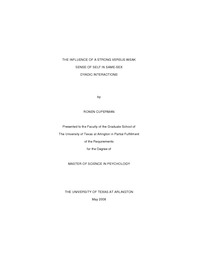
ATTENTION: The works hosted here are being migrated to a new repository that will consolidate resources, improve discoverability, and better show UTA's research impact on the global community. We will update authors as the migration progresses. Please see MavMatrix for more information.
Show simple item record
| dc.contributor.author | Cuperman, Ronen | en_US |
| dc.date.accessioned | 2008-08-08T02:31:08Z | |
| dc.date.available | 2008-08-08T02:31:08Z | |
| dc.date.issued | 2008-08-08T02:31:08Z | |
| dc.date.submitted | March 2008 | en_US |
| dc.identifier.other | DISS-2017 | en_US |
| dc.identifier.uri | http://hdl.handle.net/10106/930 | |
| dc.description.abstract | The goal of this study was to examine the influence of the participants' sense of self on the behaviors they displayed and the perceptions they reported in initial unstructured interactions. Participants were 82 male and 92 female students randomly assigned into same-sex and mixed-sex dyads, corresponding with each participant's sense of self (strong-strong, strong-weak, and weak-weak). Using Ickes et al.'s (1986) unstructured dyadic interaction paradigm, the resulting interactions occurring between dyad members were covertly audio- and videotaped, and later coded for a wide range of verbal and nonverbal behaviors. Although more interactional involvement was expected to occur for participants having a strong sense of self, a greater number of acknowledgments were actually used by those dyad members possessing a weak sense of self. Further unpredicted findings related to gender, sense of self, and a measure of the global similarity of the dyad members' personalities were also discovered. | en_US |
| dc.description.sponsorship | Ickes, William | en_US |
| dc.language.iso | EN | en_US |
| dc.publisher | Psychology | en_US |
| dc.title | The Influence Of A Strong Versus Weak Sense Of Self In Same-sex Dyadic Interactions | en_US |
| dc.type | M.S. | en_US |
| dc.contributor.committeeChair | Ickes, William | en_US |
| dc.degree.department | Psychology | en_US |
| dc.degree.discipline | Psychology | en_US |
| dc.degree.grantor | University of Texas at Arlington | en_US |
| dc.degree.level | masters | en_US |
| dc.degree.name | M.S. | en_US |
| dc.identifier.externalLink | https://www.uta.edu/ra/real/editprofile.php?onlyview=1&pid=137 | |
| dc.identifier.externalLinkDescription | Link to Research Profiles | |
Files in this item
- Name:
- umi-uta-2017.pdf
- Size:
- 191.2Kb
- Format:
- PDF
This item appears in the following Collection(s)
Show simple item record


